The giant deep-sea octopus Haliphron atlanticus does not mess around when it comes to dinner. Scientists have observed several of these cephalopods eating jellyfish in a way that indicates they could be using their stinging prey as tools to capture other snacks, according to New Scientist.
The researchers, writing in Scientific Reports, observed three H. atlanticus using remotely operated submarines from the Monterey Bay Aquarium Institute, as well as by studying the stomach contents of already-caught octopuses. They encountered two that seemed to be holding something gelatinous in their arms, though the researchers couldn’t be certain what the objects were. A third was definitively holding an egg-yolk jelly in its arms by the bell. The octopus was swimming with the jelly’s tentacles still hanging out, but it had bitten through the bell with its beak.
Giant deep-sea octopuses like H. atlanticus—commonly known as the seven-arm octopus because it keeps one arm permanently tucked away, and which can grow to more than 13 feet—are so rare to observe that scientists don’t entirely know what they eat, making these sightings particularly exciting. Other octopus species have been known to dine on fish or crustaceans, but H. atlanticus apparently targets gelatinous creatures.
Based on their observations and previous records of other cephalopods, such as the palmate octopus, the researchers speculate that beyond using jellies as a food source, H. atlanticus could be using them as weapons to catch other prey. “Haliphron may target the stomach contents of the [jellyfish], or even use the [jellyfish] as a tool to obtain more nutritious prey that are captured by the fringe of tentacles clasped within the octopus arms,” they write.
However, using their food as a tool might not be the only reason the seven-armed octopuses eat jellies the way they do. The researchers note that fish and sea turtles also target the oral arms and gonads of jellies for eating, since those are energy-dense areas of the jelly body. This study doesn’t settle the case of what these octopus do with those jellies, exactly, but it provides tantalizing evidence that they could be using their food to catch other food. It wouldn't be their only scary-smart skill.
[h/t New Scientist]
